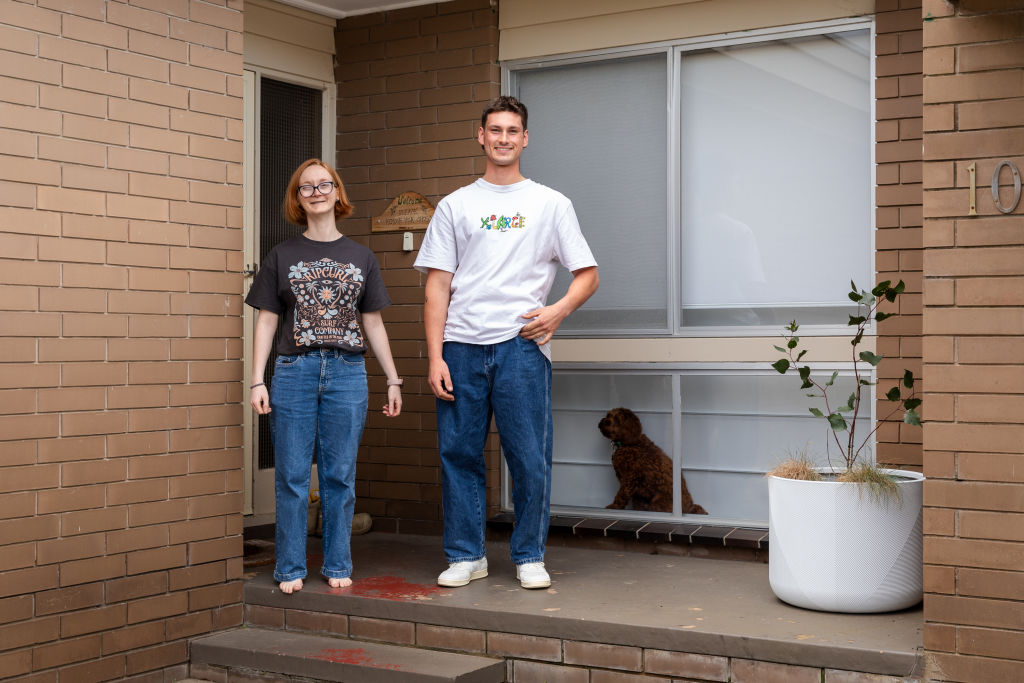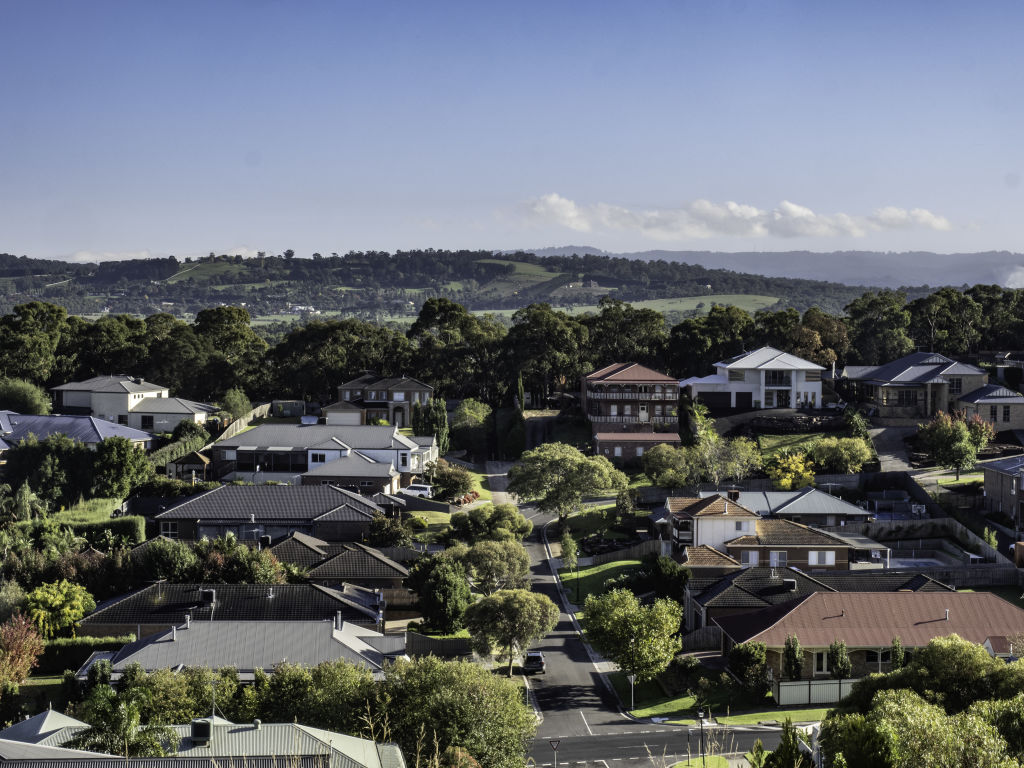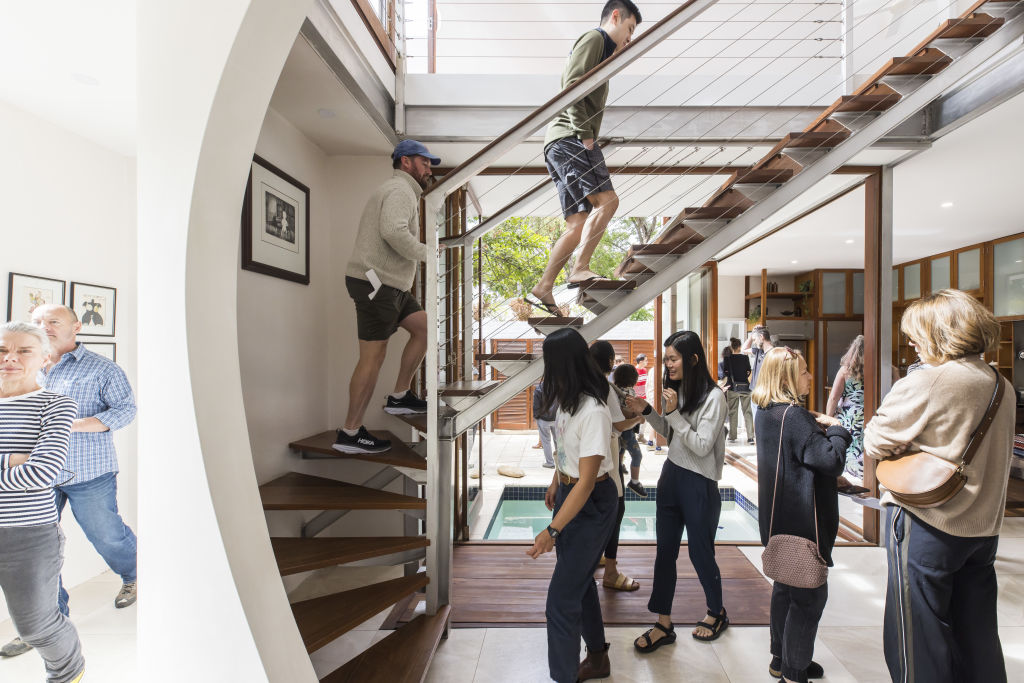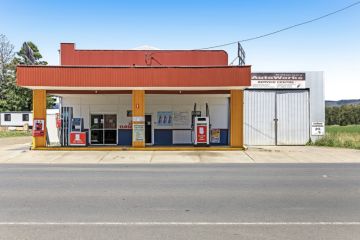Can’t afford a house? More Aussies are teaming up with their siblings to buy
You want to buy your first home, but the combined bank of mum, dad and grandparents can’t loan you enough to make up the deficit? Who ya gonna call?
The answer’s easy, according to an increasing number of wannabe owners: Your brother or sister.
With research last year by ING finding that nearly half of Australians would consider buying with someone who’s not a spouse or partner to afford to buy a home, a new trend has become clear: siblings sharing the splash-out.

“It’s pretty silly how expensive places are these days, and my sister and I both had some money saved up, so we thought, ‘Why not?’” says electrician Logan Lovell, 21, who’s just bought a four-bedroom house in Geelong for under $620,000 with his 20-year-old sister, Ellie.
“We get on pretty well, so we thought maybe it would work out well if we bought together.”
Ellie, an aged-care worker, agrees. “It was a bit of a joke at first, but then we became serious pretty quickly when we realised we could buy a much better place together than separately.
“I was a bit anxious about moving out of home, but it’s good to be living with my brother. I trust him, and we do get on.”
At their bank, NAB, lending executive Felix Sekulla says 2024 saw a 33 per cent increase in family and friends buying homes together. The highest growth was in Victoria, at 47 per cent, followed by South Australia at 37 per cent, and NSW at 34 per cent.
“It’s great to see younger Australians getting into home ownership in this way by exploring ways of putting their funds together to have higher deposits and buy in areas they like,” Sekulla said. “We always say go with someone you trust, whether it’s a family member or close friend.

“We do always recommend customers get their own individual advice, though, and documentation with the terms and conditions, so there’s also transparency. It’s great to see people like Ellie and Logan coming together to live the Australian Dream.”
It doesn’t always have to be buying a house or unit to share, either. Brothers Brent and Josh Anglim pooled their savings to buy an old, tumbling-down house on a corner block of land in Melbourne’s Highett.
They planned to subdivide the land and build three townhouses on it instead, one for each of them, and one for their mum. Sadly, however, their mother passed away while the homes were under construction and after Brent, 42, and Josh, 39, had each lived there for a few months, they decided to sell all three.
“Neither of us could have undertaken anything like that on our own, so it mostly worked out well,” says Brent. “The money we made on that venture together gave us the money we needed for the deposit for our own family homes, two streets away from each other in Cheltenham.
“If we’d have individually just saved for a deposit on our own, it would have been near on impossible to have afforded it. As you’re sitting saving, property is getting more and more expensive. So, this was a good compromise and, while we have our moments, we mostly get on well.”
The agent who sold the townhouses for them, Ray White The Bayside Group director Kevin Chokshi, says siblings buying together can work perfectly if they have a good relationship.
“If siblings join forces, it can give them greater borrowing power and more access to funds,” he says. “It means they can definitely go further and we’re now seeing it definitely as an emerging trend.”

But anyone thinking of teaming up with a sibling should make sure they sign a simple one or two-page agreement at the same time as the contract, warns property lawyer Tony Cordato of Cordato Partners. They should also go in as “tenants in common” rather than “joint tenants”, which means in the event of death, the deceased can leave their half of the property to a beneficiary, rather than to the other person they bought the home with.
“It’s a smart way of buying property rather than doing something like rentvesting,” Cordato says. “If they live in it, there’ll be no capital gains, but they should agree at the start that they’ll pay equal amounts on the mortgage and share the costs equally to avoid it getting messy.
“They should also plan an exit strategy. For instance, they’ll hold for one to five years, and then if one of them wants to get out, they’ll both agree to sell. It can be tricky agreeing on a valuation if just one wants out; better to both leave and move on to somewhere else.”
At mortgage brokers Finspo, chief executive Angus Gilfillan says rising property prices and challenging affordability are driving this trend, as well as the ability to jump up from one-bedroom units in outer suburbs to houses in more desirable areas.
“But we see this go brilliantly for some families and create lasting damage for others,” he says. “The difference comes down to getting everyone on the same page – if you can’t talk openly about money now, joint property ownership will be a disaster – as well as understanding the risks and getting the lending structure right.
“There are two main approaches to financing sibling purchases: joint home loans and separate loans (i.e., property share loans), and we have a strong preference for the latter. Each person can pay down their loan at their own pace and it’s much easier to exit the arrangement when life circumstances change.”

The sibling relationship should be as healthy as possible, too, advises Relationships Australia chief executive Elisabeth Shaw. While it can be a very positive move, you have to go into the arrangements with your eyes wide open.
Siblings should carefully work out how they get on in bad times as well as good, and how they each react when there are problems to be solved and different preferences to be navigated.
“What are your goals?” she asks. “It’s important to be transparent around them. You both might want to get into the housing market, but do you see it as a two-year investment or a five-year one? What are your parameters around girlfriends and boyfriends, and do you have a sunset clause?
“What happens when one of you gets a job interstate, and wants to move out and rent out their room? How about if one of you partners up and wants them to move in? Or if you both do? How will it be living there as a threesome, or as four people? And remember: as siblings, other family members might weigh in on decisions.”
But when things do work out, the rewards can set both siblings up for life. Twins Chloe and Luke Fitzpatrick, for example, combined their resources for a mortgage on a block of land at The Ashbourne project in NSW’s Moss Vale, developed by Novm.
Both are part of the family building company Allfitz Homes, and they then built a four-bedroom house on it, which is now for sale. With the proceeds, they’re each funding the building of their own homes in Wollondilly, to the north.
“We’re twins, so we’ve always got on,” says Chloe, 29. “It’s always been easy for us. We’ve never been worried about falling out.”
Relationships therapist Dr Amelia Haines does, however, sound a note of caution. “This can be a really good idea, and some siblings are very close and trustworthy,” she says. “But if you remember, growing up, that they always used to cheat at Monopoly, or never treated you with respect, then be careful or don’t do it!
We recommend
States
Capital Cities
Capital Cities - Rentals
Popular Areas
Allhomes
More
- © 2025, CoStar Group Inc.







